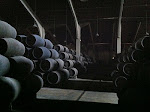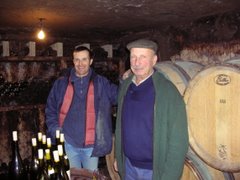Drinking Dönnhoff Young: Riesling and the Art of Minimal Sacrifice
A few weeks ago a sample box containing two bottles of wine showed up at my house. I never have high hopes when opening these things, but this one contained quite a treat - a bottle of 2008 Dönnhoff Oberhäuser Brücke Riesling Spätlese, about $50, Terry Theise Selections. It wasn't Theise or Skurnik who sent the samples, it was a group called Destination Riesling (and I originally mis-identified them as Rieslings of Europe).
I don't have a lot of experience drinking German Riesling, and if I were going to buy a Dönnhoff wine to experiment with, I would begin by reading a bit - perhaps Lyle's blog. And I definitely would have started with something a lot less expensive. Heck, I don't even know the Dönnhoff line-up, and whether or not this is one of the top sites. So I called my Riesling lovin' pal Dan Melia and he told me that this is indeed one of Dönnhoff's top wines, and that this particular bottle, the 2008, was actually his favorite wine during a recent visit to the Dönnhoff estate.
Nice! I should tuck this away for a decade or more and one day it will be brilliant. But wait a minute...Wouldn't that be kind of silly, in this case? First of all, it is a sample, and meant for me to drink in the near term, not a decade from now. Also, if I don't understand the wine when it's young, what will I gain from drinking it when it's more mature, or "better" than it is now? There would be nothing to compare it to. So I decided to drink the wine, and the only question was when.
What can I say - the wine was absolutely delicious. Such clarity, such a harmonious package of aromas and flavors. And although there have to be 80 grams of residual sugar here, and the alcohol is only 8.5%, this wine drinks as though it is dry. What I mean is that the sensation is not one of sweetness, although it is a sweet wine. It is balanced perfectly by acidity and feels lush and ripe, energetic. And I loved how on day 2 the wine showed a complex brown baking spices and earthy tone.
Neil, let me begin by saying how much I like that shirt you're wearing. Now, about Riesling...I think that you sacrifice less when you drink Riesling young than you do with any other grape. Of course good Riesling changes a lot as it ages - the fruit recedes a bit, the sweetness recedes a bit, the specific mineral and soil character becomes more prominent. But good Riesling is delicious young, and there's nothing wrong with drinking it that way. It's not like a lot of other wines that can be closed or hard when young. It's a personal preference thing. There is no best time to drink good Riesling, and I hesitate to answer when people ask me to tell them the prime drinking window for a certain wine. It really depends on how you like your Riesling.I would be tempted to dismiss this as typical wine business clap-trap that urges me to drink wine quickly, so then I of course have to buy more wine. But Dan bears no resemblance to the people who adopt that strategy in answering wine questions. This was his thoughtful response, before I drank the wine, when I asked him when I should drink it. It's an interesting idea - Riesling as great wine for young drinking in terms of minimal sacrifice.







9 comments:
I have actually read some people argue that Donnhoff should be drunk young and that it does NOT age well. I believe Lyle Fass wrote a post on it.
http://rockssandfruit.blogspot.com/2009/03/more-tns-and-why-does-donnhoff-not-age.html
I have only had Donnhoff young though, and agree it is quite delicious.
I believe it was a blouse, and not a shirt, but never mind.
Just because I fear I've come off as a namby-pamby-just-drink-what-you-like-when-you-like-it sort, I'll refine the paraphrase just a little. I do in fact believe that there can be a (subjective, obviously) best time to drink a good Riesling--as much as I loved it fresh, I might have loved that Dönnhoff even more seven or eight years from now--but my main point was that if you don't wait it out that long there is certainly nothing to feel bad about, nothing to apologize for, nothing to fear. You are not doing a disservice to a great Mosel wine if you drink it young.
In a complicated world, this strikes me not only as a virtue, but as a relief.
Duh, of course, I should have said "a great Nahe wine" in that next to last sentence, or--what I really meant--"a great German Riesling."
That is so true about the off-dry Rieslings. Even though I've yet to drink a mature Riesling from the Nahe, they are just so delicious young, it's hard for me to imagine how thy could improve.
If my experience with the Mosel is any indication, than age brings out different things, not necessarily better things.
I'm pretty much where 2GrandCru is on this. Different but not better... and very often worse. I used to buy my spatlese-style rieslings by the case or 6-pack, try one young, and cellar the rest. Not any more. I probably designate less than a third of them for aging now. (Of course the fact that I already have a sizeable stash makes that an easier decision to make.)
One of the things I like best about riesling is its cut and focus. But in the off-dry genre, that racy cut is one of the things that can diminish with bottle age, to the point where many of them become kind of dull and dreary after 5 years or so. Sometimes they develop enough depth of flavor that they don't need the structural pizzazz to stay interesting. But sometimes not... and you're left with the same sweet fruity flavors they had on release but without the energy that gave them dynamism and drive (and balanced the sweetness) -- the result sometimes tastes like a Snapple.
Donnhoff, unfortunately, is one of the producers that has a fairly poor track record in my experience. I did a Hermannshohle vertical once where everything older than 2001 was a disaster. Donnhoff has gotten more famous since then and maybe that reflects improvements in quality such that my '01s-'07s (when I stopped buying them) will have a better fate. But y'know what -- they'd have to perform at a pretty high level to taste as good as, say, the '01 Hermannshohle spatlese did when it was 3 years old. I'll take the chance with a few bottles, but I'll enjoy the rest young when they're certain to satisfy.
Some producers in the spatlese style that seem to gain intrigue with age without losing what made them compelling young are Muller-Catoir and Fritz Haag. And of course there is always the odd case of JJ Prum, which I find totally undrinkable young on account of the stink, but in the cellar they're as close to a sure thing as you can get.
Regarding Donnhoff, the folks over at Robin Garr's forum claim the problem is a lot of the older vintages were sourced from the gray market. I had a 2001 Kirscheck, I think, a few months ago and it was very fresh and nothing about indicated that it would go downhill anytime soon.
Yes, I remember at the time of that Hermannshohle tasting excuses were made and fingers were pointed at the grey market, which was nonsense -- some of the bad wines were from the official importer and well-cellared since release.
Lyle knows so much about Riesling, and if anyone is interested they should talk to Chambers Street Wines who are probably still holding many of the wines he bought and couldn't sell before he was let go, I bet they are a good deal.
Donnhoff wines are great, or so most think so. Do they age well? Most think so. Are they better when young? Maybe. Does a simple, spicy meal go good with beer that is affordable when you don't get samples in the mail of $50 Riesling because your blog gets mentioned in NYTimes? Yes.
Does Lyle Fass drink beer? No. He's a health nut and watching his figure and exercising, doing martial arts etc. Beer would only weigh him down. He said so.
Well, there are so many excellent rieslings available for under $20, that the beer price comparison is not really that valid. Even the Donnhoff estate and some of the kabinetts are in this price range if you search carefully. The base line of Mosel riesling can be had for around $10 (Dr. Loosen's "Dr. L" and Leitz something-or-other).
Keith, I have found Muller-Catoir to have some questionable corks. Now, my bottles may be gray market, who knows, but I wonder as to what failure rate you see on aging.
On some level this seems endemic to German riesling, so is that a reason you have reduced your aging stock of this category? Are improvements being made in this area?
Post a Comment